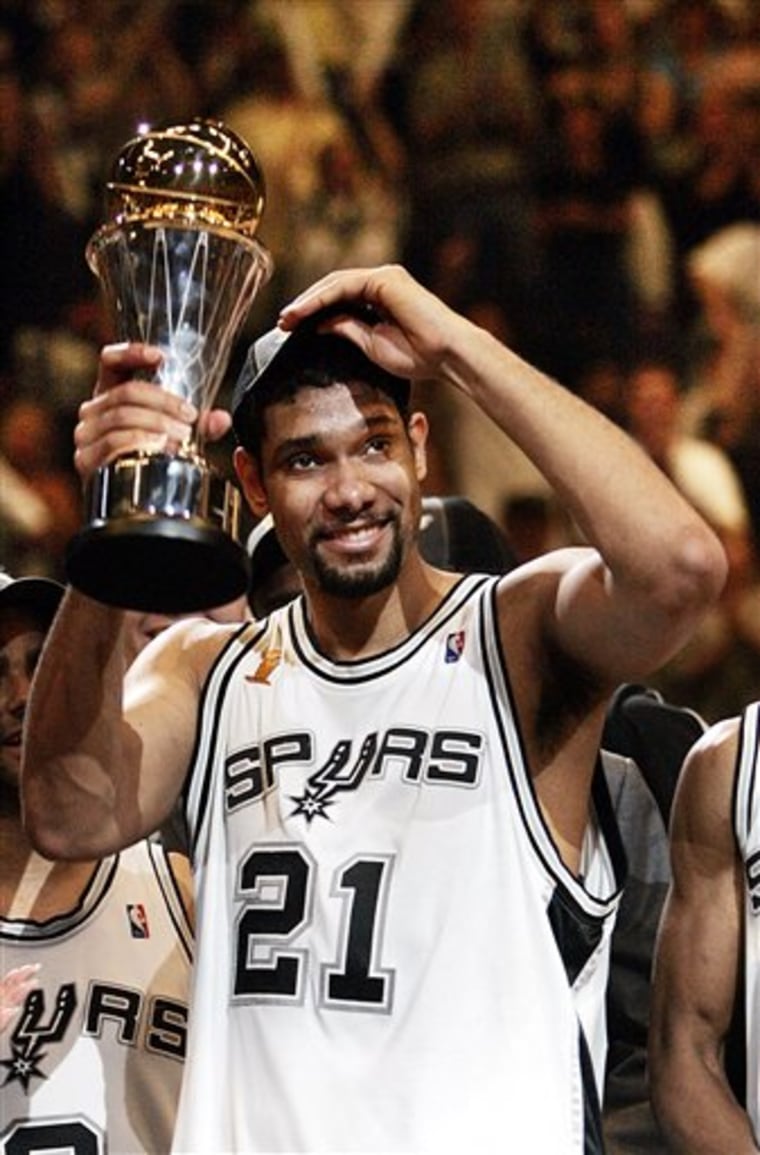Everything about sports is today. Greatness yesterday is irrelevant if you don't repeat it today. What have you done this morning? That's what counts. It wasn't enough for Tim Duncan to be first-team all-NBA every year he's been in the league, not when he missed six free throws down the stretch in Game 5. It wasn't enough that Duncan had earned MVP honors in two NBA Finals, not when he missed half of his free throws and didn't get a shot late in another loss, in Game 6.
Nobody's immune from the demands of right now, not even great players, not even the best players of their generation. For the first time in his career, Tim Duncan felt the sting of criticism because he didn't play great. He didn't play like Tim Duncan, didn't play like a guy with two championship rings. And San Antonio had little to no chance at all to take back the belt from Detroit if he continued to play the way he had lately. A nice, workmanlike effort wasn't going to be enough.
We've become spoiled over the years as it relates to the NBA playoffs and the Finals specifically. Bill Russell and Jerry West spoiled us. John Havlicek and Wilt spoiled us. Kareem and Doc spoiled us, as did Magic and Bird, as did Olajuwon and Michael Jordan. They gave us their best when the game was as frantic and as desperate as imaginable. What this series demanded was a great player being great at this very time, in the Finals, with a championship at stake in Game 7.
And Duncan, with a whole lot of us wondering what was going on with him, answered the only way that matters: He won the game. He demanded the ball the way Moses Malone used to call for it. He made hooks, he got loose for a dunk here and there. He grabbed offensive rebounds. Duncan's numbers weren't pretty like they often are in the regular season. Detroit doesn't allow pretty. The Pistons will hit you with a crowbar if you try to play pretty. Duncan didn't finish with a great shooting percentage. He got some shots stripped and a couple blocked because he was playing against professional harassers Ben Wallace, Rasheed Wallace and Antonio McDyess.
But Duncan did in Game 7 Thursday night what we've grown accustomed to seeing him do for eight NBA seasons. He understood that his team wasn't going to win unless he grabbed hold of the game, so he ignored that he missed eight straight shots into the third quarter and kept firing, the way Moses and Hakeem would have. Duncan made four of his last five shots. Oh, he hit his free throws, too. What started out as a rotten third quarter for his Spurs, with the Pistons pushing their lead to nine at one point, ended with Duncan scoring nine points and San Antonio riding him back into a 57-57 tie going into the fourth.
Whereas he was reticent and reluctant late in Games 5 and 6, Duncan was assertive and aggressive in Game 7. He demonstrated a stubbornness we'd seen plenty of times before, just not in the last week or so. He missed one of those gorgeous bank shots with the Spurs leading by four, 67-63. But when Manu Ginobili drove the lane and passed to Duncan standing 18 feet from the basket, Duncan caught, jumped and shot it in to push the Spurs' lead back to six, 69-63.
On San Antonio's next possession, after Detroit's Chauncey Billups had scored to cut the deficit back to 69-65, Duncan threatened to turn and shoot over McDyess until Rip Hamilton came to double-team him. And the moment that Hamilton committed, Duncan fired a pass to Ginobili who had plenty of room for the three-point jumper that made it 72-65.
Even when he failed to make the play successfully, Duncan was involved in trying to make the play. He determined where Detroit's defense went. And when the Spurs saw Duncan being Duncan, they were once again champions, not a bunch of guys who'd lost three of four games in the Finals and were reeling.
When Duncan became Duncan again, it was as if Ginobili was freed to play the way he had in the first two games, the way he had against Phoenix in the conference finals and against Seattle the round before that. Ginobili became daring again, going to the basket without fear of what the Pistons might do to him. And the result was free throws one trip into the paint, a flying layup the next.
But that's the way it had to happen. Duncan had to lead them, not Ginobili or Tony Parker. Duncan's the franchise player, the way Jordan was, the way Bird was. The complementary players, the guys like Ginobili (21 points, 5 rebounds, 4 assists) and Robert Horry (15 points) follow the star, particularly in the NBA. The numbers weren't as good as they have been but they also don't reflect the effort, the control of the game, specifically in the third quarter when it looked like Detroit was about to pull away and Coach Gregg Popovich had to burn a timeout.
So on a night that started with a real uncertainty about what Duncan was doing right now, the man Shaq nicknamed "The Big Fundamental" wound up walking away with his third MVP award. His decision-making when double-teamed and his willingness to keep firing were far more important than being efficient.
Duncan started the finals as the best player in the series, and after relinquishing that distinction to Detroit's Billups for five games, Duncan re-introduced himself to his teammates, to the Pistons and to professional basketball as a player with a third championship, and counting.
